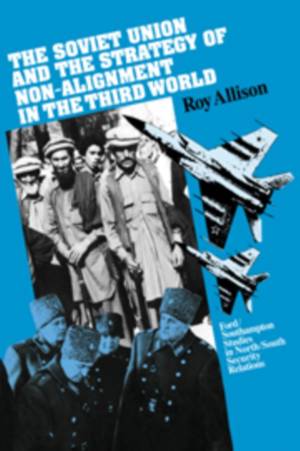
Bedankt voor het vertrouwen het afgelopen jaar! Om jou te bedanken bieden we GRATIS verzending (in België) aan op alles gedurende de hele maand januari.
- Afhalen na 1 uur in een winkel met voorraad
- Gratis thuislevering in België vanaf € 30
- Ruim aanbod met 7 miljoen producten
Bedankt voor het vertrouwen het afgelopen jaar! Om jou te bedanken bieden we GRATIS verzending (in België) aan op alles gedurende de hele maand januari.
- Afhalen na 1 uur in een winkel met voorraad
- Gratis thuislevering in België vanaf € 30
- Ruim aanbod met 7 miljoen producten
Zoeken
€ 64,95
+ 129 punten
Omschrijving
In a survey of Soviet attitudes toward the large group of Third World countries outside the primary alliances, generally referred to as the non-aligned states, the book assesses the policy implications of Soviet views on neutrality, non-alignment, the Non-Aligned Movement, neutralization, and alignment in the Third World. A primary intention is to consider how far Soviet leaders have accepted the independent foreign policy aspirations of non-aligned states and to explain the purposes behind Soviet encouragement for the status or strategy of non-alignment in the 1970s and 1980s. The study questions whether Soviet leaders are able or willing to accept non-alignment or neutrality as an intermediate status between the Eastern and Western blocs in international affairs. The Soviet view of the collective agenda of the non-aligned states on international security issues is analyzed, and the topical question of how the USSR understands military alignment and the primary North/South military relationship is examined.
Specificaties
Betrokkenen
- Auteur(s):
- Uitgeverij:
Inhoud
- Aantal bladzijden:
- 308
- Taal:
- Engels
- Reeks:
Eigenschappen
- Productcode (EAN):
- 9780521102506
- Verschijningsdatum:
- 12/03/2009
- Uitvoering:
- Paperback
- Formaat:
- Trade paperback (VS)
- Afmetingen:
- 152 mm x 229 mm
- Gewicht:
- 453 g

Alleen bij Standaard Boekhandel
+ 129 punten op je klantenkaart van Standaard Boekhandel
Beoordelingen
We publiceren alleen reviews die voldoen aan de voorwaarden voor reviews. Bekijk onze voorwaarden voor reviews.









